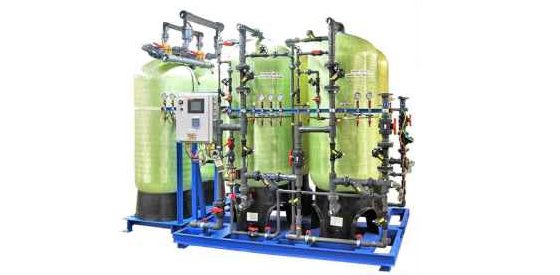De-Ionization

De-Ionization
Water Treatment UAE offers a complete line of de ionization services to protect your drinking water. Our systems remove harmful particles and pollutants from the water in your home and work environment. We have been providing industry-leading solutions for over 15 years.
Deionized water (DI water, DIW, or de-ionized water) is water that has almost all of its mineral ions, such as cations like sodium, calcium, iron, and copper, and anions such as chloride and sulfate removed. DI Water is the water of choice in many factories and manufacturing settings. It is commonly used in medical, food processing, chemical, and semiconductor industry including, including industrial cooling applications and manufacturing of cosmetics.

INDUSTRIAL SEPARATE BED DEIONIZER
A De ionization is the removal or reduction of positive ions called cations and negative ions called anions from the water supply. High purity water from 50 to 1 MICROSIEMENS/CM or better can be produced from typical water sources. The cation resin is converted to the hydrogen form and exchanges positive ions for hydrogen. The Anion resin is converted to the hydroxyl form and exchanges the negative ions for hydroxyl.
Resins are designed specifically for de ionization applications and typically regenerate with 6.4 lbs of 100% HCI per Cubic foot of cation resin and 8.0 lbs. of 100% NaOH per cubic foot for anion resin. Lakeside resins provide high chemical and physical stability, lower pressure drop, and greater resistance to bead breakage. Strong or weak base resins are selected based on the customer’s water quality requirements. Type 1 or 2 Anion resins are selected based on the silica residuals required for the specific application. Standard systems utilize pressure compensating educators for drawing chemicals.
MIX BED DEIONIZER
De-ionization is the removal or reduction of positive ions called cations and negative ions called anions from the water supply. High purity water from 1.0 to 18.3 megaohms/cm and a silica level of .10ppm to 0.01ppm or lower can be produced. The cation resin is converted to the hydrogen form and exchanges positive ions for hydrogen. The Anion resin is converted to the hydroxyl form and exchanges the negative ions for hydroxyl. Resins are designed specifically for deionizer applications regenerating with approximately 6.4 pounds of 100% of HCI per cubic foot for
cation resin and 8.0 pounds of 100% NaOH per cubic foot for anion resin. Lakeside resins provide high chemical and physical stability, lower pressure drop, and greater resistance to bead breakage. Type 1 Anion resins are standard to produce the lowest silica leakages and 10% cross-linked cation resins for durability and performance. Standard Cation regeneration is with 32% HCl. Standard systems utilize pressure compensating educators for drawing chemicals. We recommended that the total chloride and sulfate content in the dilution water should be below 25 ppm to minimize the corrosion potential. Hard minerals and salts in dilution water can increase metal corrosion, cause the formation of scale and deposits.
LAB/Aquarium De Ionizer
DI is Demineralization by Ionization. A DI filter removes the few mineral ions that make it through the RO membrane; this makes sure that the water is as pure as possible. The DI filter also removes nitrates that are not removed by the membrane. The DI filter is a cartridge filled with an ion exchange resin in the form of small beads. When the water passes by the beads, the minerals and other ions leave the water and attach to the beads.
Specification
Model no: UT-215-6
Type: De-ionization(DI) Post Water Filter
Diameter: 53 MM
Length: 254 MM Max
Flow Rate: L/24HR
Max Pressure: 4 BAR
Capacity: About 500 Gallons
Let’s Contact with us
Need help? Talk to expert
+971-554077079
Why People Trust Us
Engineering Reliability into Every System
We don’t just provide equipment — we deliver engineered water treatment solutions you can depend on. With decades of hands-on experience, certified processes, and technically precise engineering, our team ensures every system is efficient, durable, and fully compliant with international and local standards.
Proven Expertise
Quality Assurance
Responsive Support
Sustainable Solutions
Industries We Support
Our service and maintenance solutions are suitable for:
- Residential buildings & villas
- Commercial offices & facilities
- Hotels & hospitality
- Manufacturing & process industries
- Food & beverage operations
- Marine & offshore facilities
- Utilities & infrastructure projects
Maintenance & Support Approach
Our service methodology is based on preventive maintenance and performance monitoring.
Our maintenance services include:
- Routine inspection & servicing
- Membrane cleaning & replacement
- System calibration & optimization
- Emergency troubleshooting
- Performance reporting & recommendations
